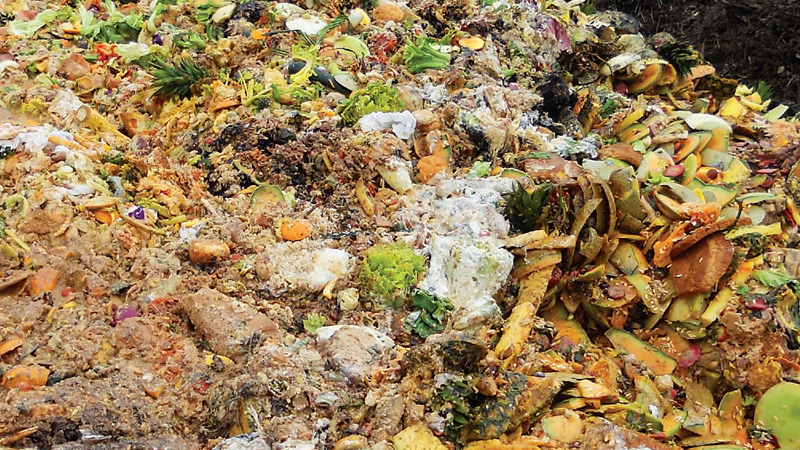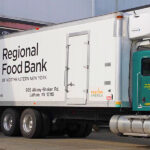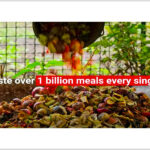Ana Carvalho
In 2006, San Diego State University (SDSU) in San Diego, California became the first university campus to participate in the City of San Diego’s commercial food scraps composting initiative. During its nine years of participation, SDSU has always looked for ways to expand the program on campus, promote different forms of food diversion and farm to fork initiatives, and host international visitors to tour the successful program.

A variety of carts are used to collect food scraps in the food service areas on the SDSU campus. Photos courtesy of City of San Diego ESD
The SDSU campus has approximately 40,000 students, staff and faculty members. In 2006, food scraps diversion was implemented at the faculty restaurant and main student dining room, diverting approximately 2 tons/week of pre and postconsumer food scraps separated by the kitchen staff. Food scraps were collected in 65-gallon carts, and transported daily from both locations by SDSU staff using a lift gate truck, to a central 30 cubic yard food waste compactor. Program logistics were determined by the City of San Diego’s Environmental Specialist and SDSU’s Recycling Coordinator. City staff also trained all kitchen and maintenance supervisors and several kitchen employees before starting the program.
All food scraps, including cooked meat, poultry and fish, bones, shellfish, egg shells, coffee grounds and coffee filters, tea leaves, parchment paper, and paper towels and napkins from the kitchen (nothing from bathrooms or cleaning areas) are accepted. The food waste carts and the compactor were well marked as Food Waste Only, and signs indicating items that could and could not be composted were posted in both kitchens. Carts were not lined, and SDSU’s staff was responsible for washing them after dumping the loads in the compactor, before returning them to the kitchens. These methods are still used today.
In 2011, SDSU expanded the program to the campus’ eight other restaurants, increasing food scraps diversion to over 3 tons/week. All food scraps diverted in the City’s commercial program are taken to the City’s Miramar Greenery for composting. The material must have <1 percent contamination by volume to be accepted.
Green Restaurant Certified

A lift-gate truck transports filled carts to a central 30 cubic yard food waste compactor. Photo courtesy of City of San Diego ESD
In 2014, SDSU inaugurated its new Student Hall, with a food court that includes 20 new food providers, including several different chain restaurants. At the time, the campus was applying for its LEED certification. Under the leadership of Duane Buske, Senior General Manager for the Aztec Shops who oversees the University’s food services, SDSU required all food providers to be certified by the Green Restaurant Association. As a requirement for that certification, all new food providers needed to participate in the University’s food scraps diversion program. That included quick service food restaurants, juice makers, coffee shops, and production areas that support catering and quick services. It also requires the SDSU’s entertainment and sports venues to comply, including the open-air Cal Coast Credit Union Theatre, the Viejas Arena, and the Tony Gwynn Stadium, with a combined capacity of over 19,000, and over 100 events in total annually.
The expansion of the program was phased in throughout 2014. Collection logistics, as determined by City and SDSU staff, continued with daily collection of the 65-gallon carts by SDSU employees using a lift gate truck, and disposition of the loads into the main food waste compactor that is serviced once a week. Phase I included all 14 restaurants from the Student Hall. Each site was given the desired number of green 13-gallon Slim-Jim containers to collect food scraps from food prep areas. The Slim Jims are emptied into centrally located 32-gallon food waste carts placed in the common areas behind groups of restaurants. Carts are kept locked to avoid odor issues, contamination of the loads, and the risk of food waste spills.
Phase II included the Viejas Arena and its four concessionaires; Phase III covered the Cal Coast Credit Union Theatre and the Tony Gwynn Stadium, each with two concessionaires. Due to the very limited space inside the concessionaries at those sites, 5 gallon buckets with lids were used. The buckets are well marked as food waste only.
As part of the City’s requirements, all participants in the food scraps program must be in compliance with the City of San Diego Recycling Ordinance, and be trained in both programs (recycling and food scraps) by City staff. The City’s Environmental Specialist trained all supervisors and as many staff as possible at all sites. Each site supervisor and SDSU’s Food and Beverage Manager ensured that all staff members who could not attend the sessions received the training. Over 350 staff members were trained in total. The program now diverts an average of 17 tons/month of food scraps.
In addition to the food scraps composting program, SDSU has a small garden on campus that provides freshly harvested produce to its faculty staff club. The university also partners with a local community garden, College Area Community Garden, assisting with the necessary engineering know-how to install water barrels to capture rainwater, and solar panels to power the site. SDSU’s Aztec Shops also partners with them, growing food that is harvested and used on campus at different dining outlets. Chef Ed Glebus from the Aztec Shops started a new Green Fork program, offering food from the garden at the dining hall’s “Plant Based” station.
The SDSU campus, with all of its food service operations, falls into the first category of organic waste generators that must comply with California’s AB 1826. Businesses that generate 8 cubic yards (cy) or more a week must source separate food scraps and yard trimmings and arrange for recycling services for that organic waste, starting on April 1, 2016.
Ana Carvalho is an Environmental Specialist with the City of San Diego (CA) Environmental Services Department.












